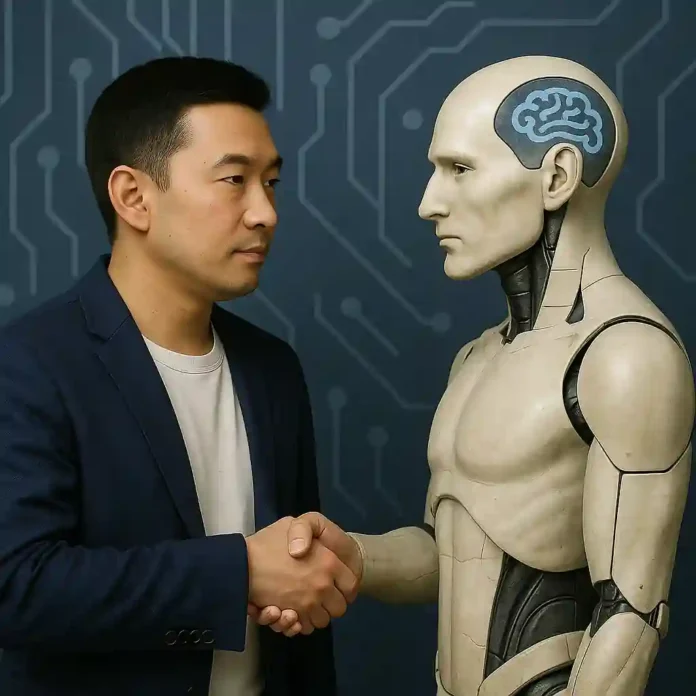In a world where artificial intelligence is becoming an integral part of our daily lives, a paradox arises: the smarter machines become, the more human we must become. The age of AI is not just changing the labor market — it is revolutionizing the very concept of the value of human thinking.
meta-skills: the art of controlling your own mind
Cognitive flexibility is becoming the new literacy. It is the ability to switch between different conceptual representations, to see one problem through many prisms. For example: a marketer can analyze declining sales as a financial problem, then switch to consumer psychology, then to social trends, and finally to technological changes. AI can analyze each aspect separately, but humans are able to intuitively connect them into a single picture.
Metacognitive awareness is the ability to think about how we think. For example: a programmer notices that he makes mistakes when he is tired and starts planning difficult tasks in the morning. Or the teacher realizes that he explains the material better through stories, and adapts his style. In a world where AI can process data faster than humans, our strength lies in understanding why we come to certain conclusions and how we can improve this process.
Human Emotional Architecture
As long as AI simulates emotional reactions, humans remain the only bearer of genuine emotional intelligence. Empathic design — the ability to anticipate the emotional needs of others and create solutions that take into account human nature is becoming a critical skill. For example: the designer of a mobile application for the elderly intuitively understands their fear of new technologies and creates an interface with large buttons and simple navigation, while the hospital architect takes into account the psychological state of patients by placing windows so that the rooms have a view of nature.
Emotional stability in an era of constant change is turning from a useful quality into a necessity for survival. It’s not just stress tolerance, but the ability to use uncertainty as a catalyst for growth.
Creative Thinking: Beyond Algorithms
AI can generate a variety of options within the given parameters, but conceptual creativity — the creation of fundamentally new thinking frameworks — remains the prerogative of humans. For example: the creator of Airbnb saw empty rooms not just as unused space, but as the basis for a new economy of trust. Or the inventor of biomimicry looked at the thorns of a burdock and created a Velcro fastener. It is the ability not just to combine existing elements, but to create new dimensions to solve problems.
Abstract systems thinking allows you to see connections where AI does not see them. A person is able to intuitively understand complex systems through metaphors, analogies, and patterns that cannot be formalized.
Social engineering of human relations
Intercultural intelligence is becoming especially valuable in a globalized world. It is not just the knowledge of cultural differences, but the ability to create bridges between different ways of thinking and perceiving the world.
Collaborative leadership is the ability to organize human and AI collaboration, where each participant uses their unique strengths. This requires an understanding not only of human psychology, but also of the principles of AI systems.
Ethical thinking in the digital age
Algorithmic ethics is the ability to evaluate the moral consequences of decisions made by AI systems. This includes understanding how bias in data affects results, and the ability to design more equitable systems.
Digital wisdom is the skill of discerning when to rely on AI and when to use human judgment. It is the art of balancing the effectiveness of automation with the need for human control.
Human Biological Advantage
Intuitive cognition is the ability to come to the right conclusions based on incomplete information, using accumulated experience and subconscious processing of patterns. For example: an experienced doctor can make a diagnosis based on subtle signals in the patient’s behavior that are not detected by medical devices. Or an investor feels the potential of a startup not only according to the business plan, but also according to the energy of the team. AI can analyze big data, but human intuition works with “small data” — implicit signals and context.
Body wisdom is an understanding of how physical condition affects cognitive processes. In an era when work is becoming more intellectual, the ability to use the body to optimize thinking is becoming a competitive advantage.
Skills to adapt to uncertainty
Antifragility of thinking is the ability not only to survive in conditions of chaos, but to become stronger from stressful influences. This includes the ability to see opportunities where others see only threats.
Experimental thinking is the willingness to constantly test hypotheses about reality. In a world of rapid change, those who know how to quickly verify and correct their assumptions gain a significant advantage.
Conclusion: humanity as a competitive advantage
The paradox of the age of AI is that the more advanced technology becomes, the more important our most human qualities become. The future belongs not to those who try to compete with AI in its strengths, but to those who develop uniquely human abilities.
Investing in developing these skills is not just about preparing for the future job market. This is the development of what makes us human in a world where the boundaries between human and artificial intelligence are becoming increasingly blurred.
Ultimately, our goal is not to become more like machines, but to become more human than ever before.
Disclaimer: This article presents general trends in the development of skills in the age of AI and may not fully reflect the specifics of the labor market in Kazakhstan. The recommendations are informational in nature and should be adapted to local conditions, cultural characteristics and the pace of implementation of AI technologies in various sectors of the economy of Kazakhstan.



